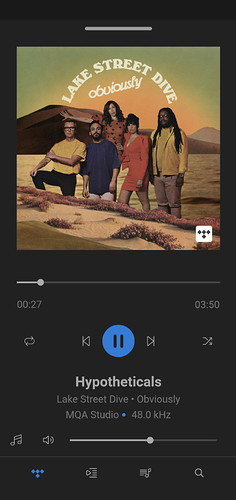I get that; I was being facetious, and it wasn’t really the point of our exchange. How about a “yeah, I may have overstated the case against Lumin”?
I will absolutely not say that, Greg. The fact that Lumin lacks any conventional audio digital inputs (optical, coax, USB) renders it utterly useless for my needs.
dCS at least can ingest a variety of conventional digital audio, and I can use my laptop to feed it MQA.
Either way, it’s a moot point, as MQA seems to be working now on my Bartok natively, as stated in my previous post.
Yes!! Good news! MQA is working now on Mosaic again!!
Another reason why I only use Mosaic to adjust settings and not for playing music.
I like very much Mosaic! , I can control all easily in mi Pixel ( Android) , even the volume , I’m going directly from Bartok to D’ Agostino power amp ( XLR Transparent Reference) and I’m using only ethernet for all , UPnP, Tidal, Qobuz, radio, all except CD.
Thank (your) god it works again:
Wow.
I have to say I can’t believe so many people on this forum even play MQA files. Why run a lossy format through high end DCS gear!? That is mind blowing to me!
One very good reason is that lossless hi-res streaming for access to a wide range of musical genres is currently available only with Qobuz. Qobuz is available in only 12 countries at this point and many of the contributors here do not live in any of them. Tidal is not similarly territorially restricted.
So MQA is for many the best choice that is actually available to them. I have read the various arguments about MQA being lossy but does it actually sound offensively bad ?
To my ears, it follows the same rule as other types of material—if the recording and mastering are done right, it can sound fantastic. The opposite is also true. I’ve heard phenomenal, and I’ve also heard poorly-sounding material.
I have always intended, but never quite got around, to critically audition the same material in MQA and via other sources. Tidal and Qobuz are both available in my region, so I might give it a whirl one of these days.
Hi Pete,
Thanks for your thoughtful reply. That makes sense.
To me, and I’m happy to be alone with this, there is no point in spending for DCS’s incredible DSP and upsampling technology if you are going to feed it with a lossy codec.
Hence my surprise…
Because it sounds great DCS did a great job developing their MQA filter.
Now that is hilarious.
Maybe DCS can develop a MP3 filter. A subset of the community will claim it sounds great (!)
Wait til they develop cigarette filters
dCS Bartok is so good that some internet radios as Radio Paradise and others ( AAC 317 quality in Mosaic) sounds really well. “AAC filter” works well…
Just because many companies used the available MQA filters does not mean that all of them did. DCS created their own and to get the sound they wanted.
I
I am not sure that is correct. I believe that in order to function the MQA filter is the MQA filter. There is however flexibility in how it is implemented technically. Of course dCS products do not have filters to produce a sound that they want, The choice, where available, is for the sound that you want.
I think dCS will jump in and confirm they created their own MQA filter. I am not sure if it was stated on one of the sites or presented to us at one of the events John Quick attended. If I remember correctly MQA gave their blessing.
The filter is a dcS engineered solution but in accordance with MQA’s fundamental specification or ideal for it. Here is Bob Stuart on the subject:
" the MQA and dCS teams were able to work together to develop
code which accurately matched the MQA hierarchical ideal reconstruction to analogue."
It has nothing do with a preferred sound but is to do with accurately matching MQA’s requirement. The filter per se is MQA’s specification, how it is implemented is down to dCS.
Excellent point mwilson. This was EXACTLY my reason for staying away from those otherwise well built sole-purpose devices like the Aurender’s.
